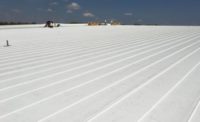Flexibility is one of the most important, though often most overlooked, features of a roofing system. Rooftops come in all shapes and sizes, and often one of the biggest challenges for contractors who are installing a roofing system is finding a roofing material that provides the flexibility needed to accommodate the contortions of the rooftop. Church rooftops are often a prime example of such challenges.
Midwestern contractor CCR Roofing Services LLC recently encountered just such a rooftop challenge when their team was chosen to complete a re-roofing project on a local church. With decades of experience in commercial and residential roofing, the team at CCR Roofing Services was not daunted by the challenge presented by Christ the King Church in Florissant, Mo.
After years of hail damage, leaks, repairs, and subsequent patching, the existing TPO (thermoplastic polyolefin) roofing system on the church sanctuary was in desperate need of a complete replacement. This re-roofing project presented a particular challenge because it was composed of nine continuous roof sections with varying angles and slopes of 32:12 to 16:12. Each section featured a peak that extended 39 feet above the flat, lower portion of the rooftop. It was clear that this rooftop required a uniquely flexible roofing membrane that would accommodate its steep slopes and unique structure.
While the team at CCR Roofing Services knew this would be a challenge, they did not hesitate when deciding which roofing membrane to utilize: Versico’s VersiWeld High Slope TPO membrane. The high slope TPO membrane is specially formulated to provide that extra element of durable performance and fi re resistance required for high-slope roofing systems.
In addition to its enhanced flame-retardant characteristics, the TPO membrane is extremely pliable and weldable, manufactured with a unique combination of ethylene-propylene rubber and polypropylene. This meant that the TPO membrane would provide the flexibility CCR Roofing needed to install a roofing system on the peaks and valleys of this church.
Intensive planning was required before this 9,479-square-foot rooftop installation could begin. The team at CCR created a number of troubleshooting options for attacking this rooftop, including intricate scaffolding systems and cantilevered repelling systems, among other ideas. After evaluating all of their options, CCR decided the best approach would be to use 40-foot ladders for installation on the lower portions of the rooftop and a repelling system for installation on the high points and slopes.
Once a plan was in place, CCR began tearing off the existing TPO membrane system down to the wood plank deck. The next step in this installation was to mechanically fasten a 1-inch layer of Versico’s SecurShield CD polyiso insulation directly to the wood deck.
The combustible deck polyiso insulation is composed of a 1-inch layer of polyiso laminated to heavy, durable glass facers that provide additional heat and flame resistance, eliminating the need for slip sheets or coverboards. In addition, it features impressive wind resistance and compressive strength, all while providing a high R-value that can significantly increase a building’s energy efficiency. This premium insulation would also help to prevent the occurrence of the moisture retention and disintegration that had plagued the building’s existing roofing system.
The unique installation system that CCR put in place for this project, with 40-foot ladders and repelling lines, required that each piece of insulation and roofing membrane be precut for each rooftop section on the ground before being lofted up onto the rooftop for installation.
Once the insulation was installed, the TPO was rolled out and adhered with Low-VOC Adhesive Primer, an adhesive that is specially formulated for use on vertical walls or steep-slope rooftop areas like those on the sanctuary of Christ the King Church. The primer has a fast set-up time and can be used in temperatures as low as 25 degrees Fahrenheit, which made it an ideal adhesive option. After the TPO was fully adhered to the rooftop, ensuring optimal wind uplift resistance, all of the membrane seams were carefully hand-welded to create watertight, long-lasting seams that would withstand the severe weather conditions often experienced in Florissant, Mo.
The entire re-roofing project was complete in little over a month, enabling Christ the King Church to continue its services without any fear of leaks, poor indoor air quality, reduced energy efficiency, or hail storms.





